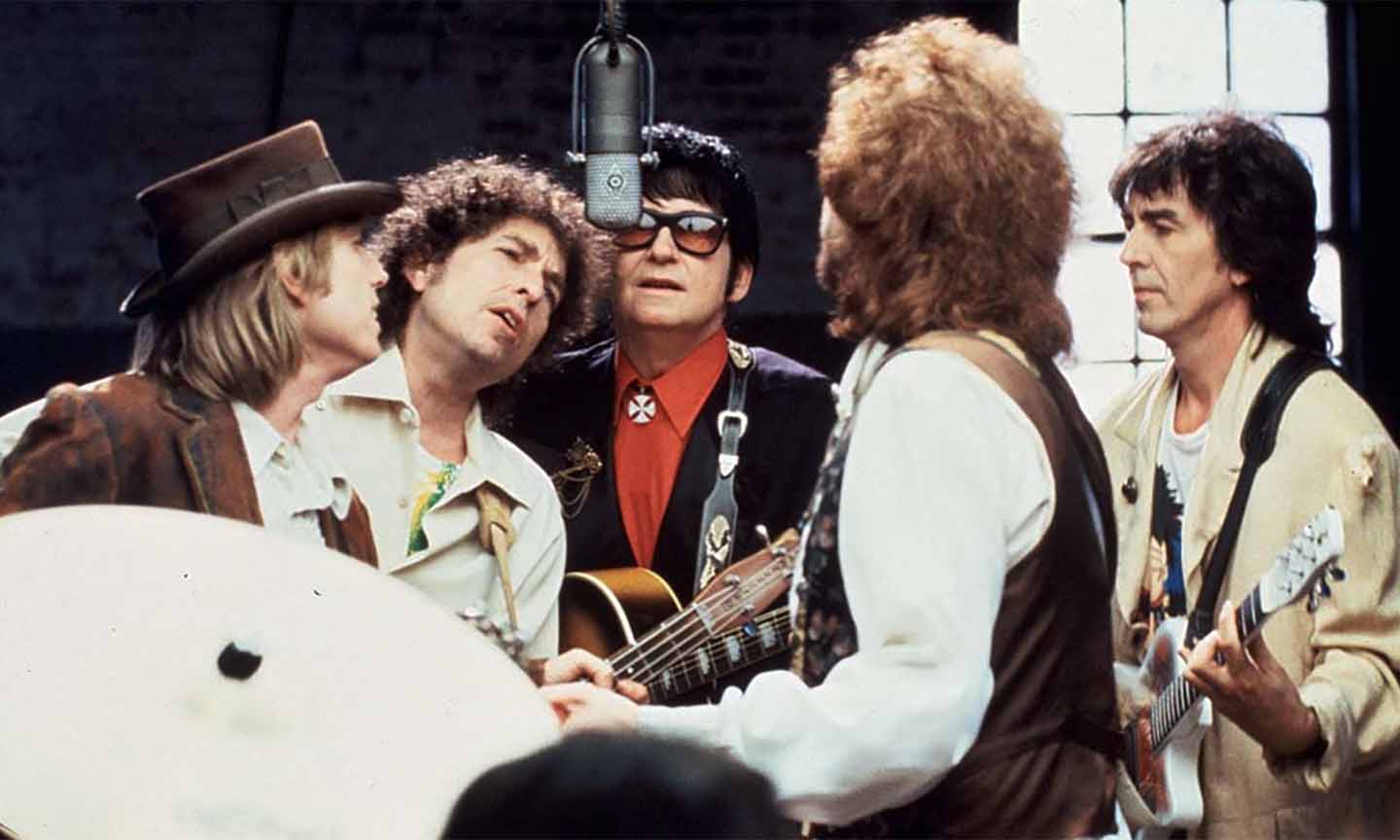Lucky, Lefty, Nelson, Otis and Charlie T, Jr – together, they were known as The Traveling Wilburys, but who was really behind the curly hair and shades? One obfuscating legend claimed they were “the only known surviving members of this once great tribe of wandering musicians,” with an ancestry that “goes back so far that their exact origins have become extremely difficult to… separate from the legends and myths that have grown around them.”
The irony was that this was just one of many myths that surrounded the musicians who, individually, had been the subject of many a rock’n’roll rumor before they joined forces as The Traveling Wilburys. By the time Bob Dylan, George Harrison, Roy Orbison, Tom Petty, and Jeff Lynne convened in 1988, they’d individually been the subject of many an article – and, in some cases, book – that invariably raised more questions than they answered. That said, the fact that the group existed at all seems to have been augured by the fates. Turns out the Wilburys had been crisscrossing each other’s paths for decades.
Listen to The Traveling Wilburys Collection on Apple Music and Spotify.
Roy Orbison, for instance, had toured with The Beatles at the height of Beatlemania, establishing himself as a massive star in the UK. Shortly after, Dylan and Harrison became life-long friends – and professional rivals – as he and The Beatles pushed rock music to ever greater heights during the 60s. As the 70s dawned, Dylan was guest of honor at the Concert For Bangladesh – a rare appearance during that period in his career, and something only Harrison could have conjured.
A magnet for creative talent, Harrison enlisted Jeff Lynne to produce his 1987 solo album, Cloud Nine. That same year, Dylan was touring with Tom Petty & The Heartbreakers as his backing band, and it wouldn’t be long before Lynne was manning the boards for solo albums by Tom Petty (Full Moon Fever) and Roy Orbison (Mystery Girl).
Despite the self-created myth that surrounded “Lucky,” “Lefty,” “Nelson,” “Otis” and “Charlie T, Jr,” the Wilburys’ creation story is actually pretty well known: Harrison needed a B-side for his Cloud Nine single “This Is Love,” fortuitously had three of the others on hand to pitch in, and brought Petty into the fold when he swung by the erstwhile Heartbreaker’s house to retrieve his guitar. The result, “Handle With Care,” was too good to hide away on a single flip… so while these multi-millionaire rock stars were enjoying making music with no egos or no pressure – playing and recording just for the fun of it – they thought they’d knock out a whole album.
They chose their Traveling Wilburys moniker after the nickname that Lynne and Harrison had for spooky goings on with studio equipment – and, as Petty put it, because they “didn’t want it to sound like Crosby, Stills, Nash & Young, like a bunch of lawyers.” In the studio they captured magic: a whole history of rock’n’roll, country, and pop, making the Wilburys a perfectly formed supergroup that embodied the very essence of Americana.
With a nod to Orbison’s Sun labelmates, the famed Million Dollar Quartet – Elvis Presley, Johnny Cash, Jerry Lee Lewis, and Carl Perkins – the individual Wilburys can comfortably claim to be the Billion Dollar Quintet. Come with us behind the shades as we pin these traveling troubadours down…
Bob Dylan (aka Lucky Wilbury)
In the early 60s, Bob Dylan emerged as an astonishingly prolific folk singer who doffed his flat cap to Woody Guthrie; with songs such as “Blowin’ In The Wind” he quickly established himself as a pioneering protest singer. Fast outstripping that scene, however, Dylan altered the face of rock music with his “thin, wild mercury sound,” as captured on Blonde On Blonde, and elevated lyric-writing to the level of poetry with epochal songs the likes of “Mr Tambourine Man” and “Like A Rolling Stone.” “Tangled Up In Blue” remains a masterpiece from his mid-70s “break-up album,” Blood On The Tracks, while “Hurricane” saw him return to the protest themes that he initially made his name with.
Traveling Wilburys highlights: “Tweeter And The Monkey Man,” “Dirty World,” and “7 Deadly Sins”
Listen to the Lucky Wilbury playlist on Spotify.
George Harrison (aka Nelson Wilbury)
As one of The Beatles, George Harrison blazed a trail through pop music like no other guitarist of his generation. He is almost single-handedly responsible for introducing Eastern music into mainstream Western rock and pop, while, as the 60s progressed, he became that rarest of beasts: a lead guitarist with impeccable songwriting skills. “Here Comes The Sun,” “While My Guitar Gently Weeps” and “Something” remain some of The Beatles’ most-loved songs; after the group split, Harrison burst forth with an almost unstoppable creative flow, penning classics such as “My Sweet Lord” and “Give Me Love (Give Me Peace On Earth),” while also recording the definitive version of the Rudy Clark-penned “Got My Mind Set On You.” Though he succumbed to cancer in 2001, his posthumous album, Brainwashed, released in 2002, contained “Stuck Inside A Cloud,” which proved that Harrison’s creativity remained undimmed right until the very end.
Traveling Wilburys highlights: “Handle With Care,” “Heading For The Light,” and “Maxine”
Listen to the Nelson Wilbury playlist on Spotify.
Roy Orbison (aka Lefty Wilbury)
The one Wilbury with roots to Sun Records and the birth of rock’n’roll in the 50s, Roy Orbison brought a special gravitas to the group. With songs such as “In Dreams” and “Only The Lonely,” Orbison patented a strain of emotive songwriting that continues to send chills down the spine, while “Oh, Pretty Woman” showed that he could knock out a transatlantic pop No.1 with ease. A late-period resurgence led to him working with Jeff Lynne on sessions that produced the classic “You Got It,” while “I Drove All Night” (posthumously issued as a single in 1992, but recorded in 1987) took Orbison back into the US Top 10 for the first time in 25 years, and proved that his expressive vocals had lost none of their power over their time. Orbison died of a heart attack in 1988, between Wilburys albums, but his spirit very much pervades the group’s second – and final – album.
Traveling Wilburys highlights: “Not Alone Any More,” “Last Night,” and “Handle With Care”
Listen to the Lefty Wilbury playlist on Spotify.
Tom Petty (aka Charlie T, Jr, Wilbury)
As both a solo artist and leader of The Heartbreakers, Tom Petty has embodied heartland rock like no other artist. The Heartbreakers might have emerged at the height of punk, yet songs such as “American Girl” established the group as a raw roots-rock outfit that could more than hold their own among the political firebrands. As a solo artist, Petty raced to the upper echelons of the charts with the likes of “Free Fallin’” and “I Won’t Back Down.” He has since settled into the role of roots-rock custodian, issuing acclaimed albums at his own pace, while presenting his own radio show, Buried Treasure, on Sirius Satellite Radio.
Traveling Wilburys highlights: “Last Night,” “Cool Dry Place,” and “You Took My Breath Away”
Listen to the Charlie, T, Jr, Wilbury playlist on Spotify.
Jeff Lynne (aka Otis Wilbury)
A leader of Electric Light Orchestra, Jeff Lynne established his group as the 70s’ answer to The Beatles, working up increasingly ambitious pop-rock masterpieces such as “Livin’ Thing” and “Mr. Blue Sky,” which have gone on to define the decade. It’s fitting, then, that in the wake of ELO’s split, Lynne would go on to co-produce George Harrison’s latter-day solo material, and eventually worked with The Beatles themselves when he helped them complete “Free As A Bird” and “Real Love” from unfinished John Lennon demos for the Anthology project in the mid-90s. Though Lynne’s own solo albums have been few and far between, “Every Little Thing” and “She” remain highlights in a hugely varied back catalogue.
Traveling Wilburys Highlights: “Rattled,” “Poor House,” and “Runaway”




